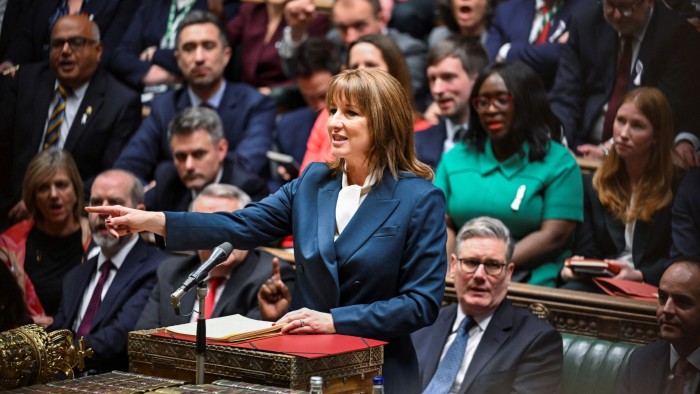Share this @internewscast.com
Gain Complimentary Access to the Editor’s Digest
The author serves as the Rene M Kern professor of practice at the Wharton School, is the chief economic adviser at Allianz, and presides over Gramercy Fund Management.
In the aftermath of the UK Budget announcement, market participants breathed a collective sigh of relief, seemingly appreciating the government’s commitment to fiscal responsibility. The atmosphere was one of cautious optimism as investors observed the government’s steps toward economic prudence.
In the previous year, the newly elected Labour government took a bold approach with their Budget. They decided to endure short-term financial pain by significantly increasing revenues, hoping that this would pave the way for enhanced productivity and economic growth in the long run. However, this ambitious strategy did not withstand the pressures of real-world challenges.
On Wednesday, as Chancellor Rachel Reeves presented her second Budget, it was evident that unforeseen events and some self-inflicted setbacks necessitated another round of stringent fiscal measures. External shocks and policy missteps had created circumstances that demanded significant financial adjustments.
For a fleeting moment, the scale of the tax initiatives and the establishment of a larger-than-expected safety net against potential adversities provided a sense of security to investors. This was reflected in the financial markets, where yields on UK government bonds decreased, showing an improvement both in general and compared to German and US bonds. Concurrently, the British pound strengthened, and equity markets experienced slight gains.
But if the short-term market verdict was favourable, the long-term verdict is far from sealed. If this Budget fails to ignite the growth and productivity engines, the UK risks extending a loop where each subsequent fiscal event becomes harder than the last, risking higher borrowing costs for both the public and private sectors, as well as inflation-causing currency depreciations.
To understand the chancellor’s bind, one must look at the shocks of the past 12 months. The government’s first Budget was defined by a grim inheritance and a manifesto that straitjacketed the Treasury by ruling out rate rises on income tax, value added tax and employee national insurance. Constrained, Reeves piled the burden on employers. The hope was that this would be the high-water mark of taxation.
That hope has been dashed. A rise in global protectionism is a headwind no open economy such as the UK can ignore. Worse, the government scored a series of own goals. Policy U-turns and confused policy messaging fuelled an “uncertainty risk premium”, pushing market interest rates higher than they otherwise would have been. The economic backdrop became consequently grimmer than hoped for, a development underscored by the Office for Budget Responsibility, which downgraded its projection for average growth over 2026-29 by 0.3 percentage points to 1.5 per cent, citing productivity weakness.
Having rejected a general rise in income tax rates — which would have broken a manifesto pledge but solved many fiscal headaches — Reeves opted for a cocktail of measures, some backloaded. These include freezing tax thresholds and a series of smaller levies and the closure of loopholes.
The chancellor also announced adherence to the IMF’s recommendation to limit fiscal headroom assessments to once a year and, crucially for markets, increased that headroom — the buffer against unanticipated shocks — to a more robust £21.7bn by 2029-30 and close to the average under the last six chancellors. It was this commitment to prudence that stayed the hand of the bond vigilantes.
There is much to commend in Wednesday’s Budget package. Despite the fiscal constraints, the government has protected public investment and public services. The elimination of the two-child benefit cap is a laudable move to aid the vulnerable. However, the cocktail approach to revenue raising is fraught with risk.
By hunting for cash in the nooks and crannies of the economy rather than using broad-based tools, the chancellor risks creating a distorted, leaky tax base.
Such measures are vulnerable to implementation slippage, invite aggressive avoidance strategies and add friction to an economy that desperately needs lubrication. The government risks having traded a political problem now, breaking a manifesto promise, for economic complications later.
This year’s Budget was never going to be easy. To her credit, Reeves has made a credible attempt to make lemonade out of lemons, a feat acknowledged by the markets’ reactions. Yet the strategy hinges on a gamble: that this specific “mosaic” of taxes will not choke off the very animal spirits the government needs to cultivate.
Despite the fiscal prudence of the Budget, if businesses and households retrench as a result of the measures, the fiscal hole will reopen. The chancellor has bought herself time with the markets; now she must bring sustained implementation, higher productivity and inclusive growth.








